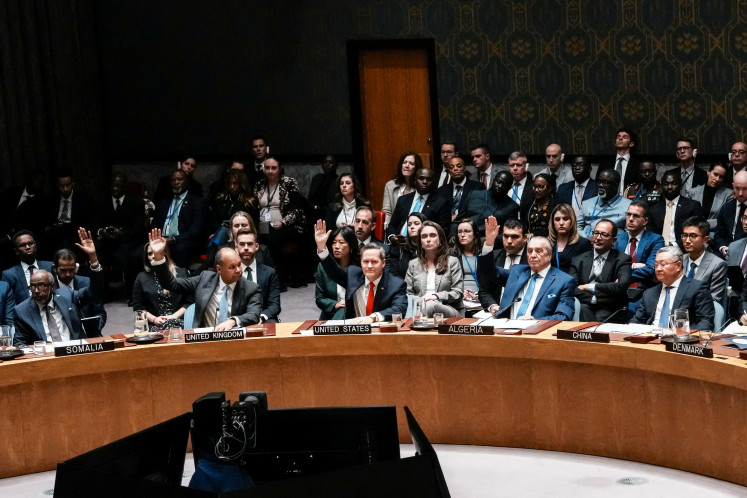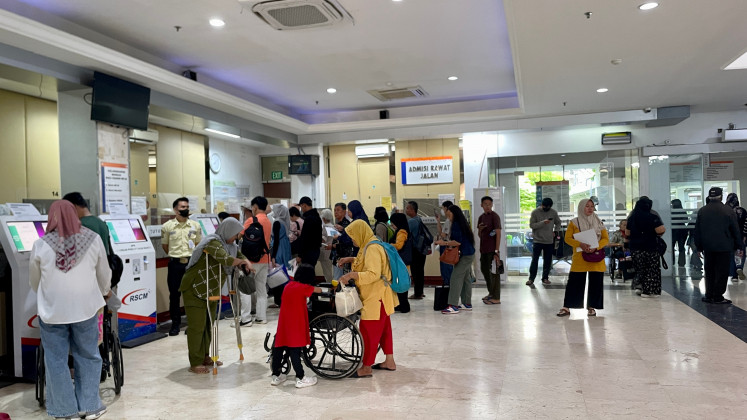Popular Reads
Top Results
Can't find what you're looking for?
View all search resultsPopular Reads
Top Results
Can't find what you're looking for?
View all search resultsMelinda Gates lauds global progress on family planning
More than 200 million women and girls in the developing world still have no access to proper healthcare, family planning services and education, forcing governments, donors and all levels of society to strengthen commitments in terms of finance, politics and legislation
Change text size
Gift Premium Articles
to Anyone
M
ore than 200 million women and girls in the developing world still have no access to proper healthcare, family planning services and education, forcing governments, donors and all levels of society to strengthen commitments in terms of finance, politics and legislation.
Melinda Gates, co-founder of Bill and Melinda Gates Foundation, spoke at the panel of the third Women Deliver Global Conference in Kuala Lumpur on Wednesday and said that a year after the transformational London Family Planning Summit, she had seen so much progress in many countries, including in Senegal, Zambia, Indonesia, Bangladesh and the Philippines in terms of scaling up healthcare and education access for women and girls.
At the summit, she said, donors committed US$2.6 billion to funding such programs. 'These funds are critical, because they will help countries implement ambitious national plans. To me, this is the most important development in the months since the summit,' Gates said.
Now governments in about 24 countries are creating plans that incorporate family planning programs into their women and children's health programs.
'The leadership I have seen in those countries is a strong indication that the current approach is indeed new and innovative,' said Gates.
The donor community, she said, had stressed that women and girls were central.
'But putting women at the center requires a lot from us as advocates. It means we have to look at access not just from our point of view. As a metric we can track from the central office. We also have to look at access from their [women's] point of view'.
'Our [donor] community is working with the private sector to lower the prices of key supplies, such as contraceptive implants. We do that because it will give women affordable options for planning their families and their futures.'
Gates said there was more hard work ahead.
'We have to do it together. We have made a start we can be proud of. We've laid big ambitions and we are building the foundation of a global movement that can fulfill those ambitions.'
However, she also spoke of some regrets.
'Not every donor has made a pledge. Not every country has made a commitment and a plan.'
The three-day conference focuses on finding solutions to empower girls and women, to invest in programs for their welfare, to develop action plans for ensuring that girls and women are prioritized in new development frameworks and laying out a clear, measurable road map to success.
Meanwhile, the second speaker, Babatunde Osotimehin, executive director of the United Nations Population Fund (UNFPA), said the UN had launched the global 'Every woman every child', campaign since 2010, which mobilized new support and intensified action by governments, donors, civil society and the private sector to address the major health challenges facing women and children worldwide.
With over $40billion pledged to date, the campaign aims to save the lives of 16 million women and children by 2015.
Every year, around 287,000 women die from pregnancy-related causes. Another 5.7 million suffer long-lasting illnesses or disabilities caused by complications during pregnancy or childbirth. The consequences of losing these women effects in families in the sense that children without mothers are less likely to receive proper nutrition and education. The implications for girls tend to be even greater, leading to a continued cycle of poverty and poor health.
According to the UNFPA's data, maternal and newborn deaths slow economic growth and lead to global productivity losses of some $15 billion every year.
'The UNFPA supports activities to improve maternal and reproductive health in over 90 countries, including Indonesia, through technical and financial assistance for reproductive health programs to ensure all women and girls have access to improve their lives,' said Osotimehin.










